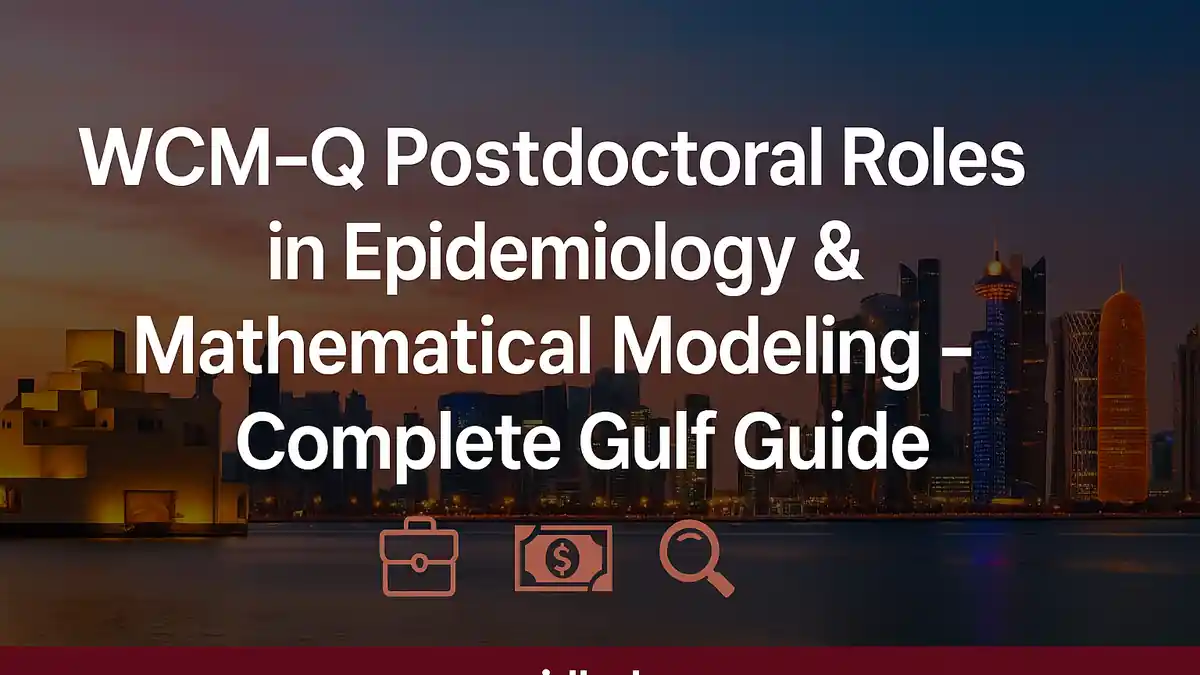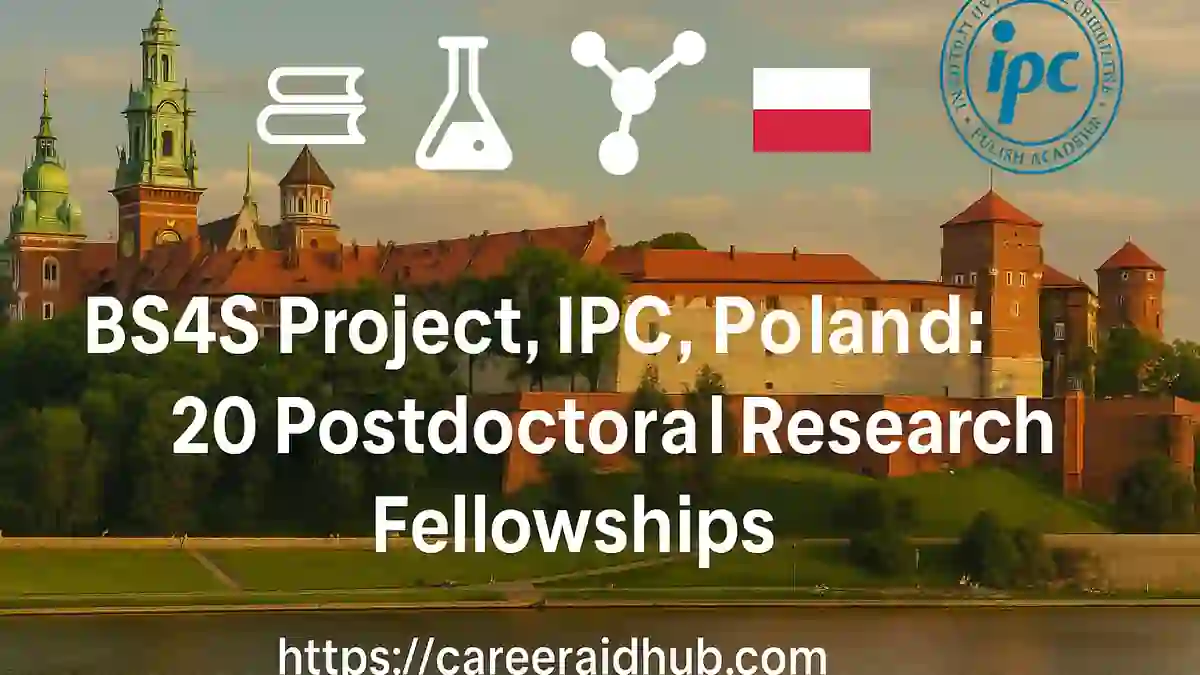Introduction to the Senior/Postdoctoral Associate Role at SMART
The Senior/Postdoctoral Associate Singapore-MIT Alliance for Research and Technology position is a high-impact research opportunity based in Singapore. It sits within the Antimicrobial Resistance Interdisciplinary Research Group (AMR IRG) at SMART, a long-term collaboration between MIT and Singapore.
For PhD graduates in chemical, biomolecular, or biological engineering, this role offers the chance to work on advanced diagnostics that address antimicrobial resistance in the Asia-Pacific region. In this guide, you will find a clear overview of the role, eligibility, responsibilities, and application steps, with a special focus on how international researchers can prepare competitive applications.
Why This Senior/Postdoctoral Associate Position Matters
Antimicrobial Resistance and Translational Impact
Antimicrobial resistance (AMR) is now recognised as one of the most serious public health challenges worldwide. However, clinicians often lack rapid tools that can tell them whether an infection is bacterial and which antibiotic will work best during a single patient visit.
The AMR IRG at SMART focuses on solving exactly this problem. The team is working on a multi-plex diagnostic test that can detect common resistance mechanisms across the Asia-Pacific region and still meet strict clinical adoption standards. Therefore, the Senior/Postdoctoral Associate will contribute to technology that can move from lab bench to clinic in a relatively short time.
Eligibility and Ideal Profile
Academic Background and Core Requirements
SMART
-
- A PhD in Chemical, Biomolecular, Biological Engineering or a closely related field. Engineering or quantitative science backgrounds are preferred.
- Demonstrated experience with laboratory assays such as PCR, ELISA, and flow cytometry.
- Experience in assay design for detecting low-abundance biomarkers.
Laboratory and Technical Skills
In addition, the official job description highlights several technical expectations:
-
- Experience working in BSL2 biosafety conditions and handling complex fluids such as wastewater or blood.
- Strong skills in experimental design, including systematic studies and informative controls.
- An impactful publication record, ideally with papers or patents that show innovation and translational potential.
Therefore, candidates should demonstrate that they can design, execute, and troubleshoot experiments independently while keeping clinical translation in mind.
Soft Skills and Professional Attributes
Beyond technical expertise, the AMR IRG emphasises:
-
- Strong written and verbal communication skills.
- High levels of organisation, adaptability, and responsiveness to feedback.
- The ability to work collaboratively in a multidisciplinary team, while alsomentoring junior team members.
For applicants, this means tailoring the CV and cover letter to highlight teamwork, cross-cultural collaborations, and mentoring experience, not just experimental results.
Key Responsibilities and Research Focus
The Senior/Postdoctoral Associate role at SMART is not a routine bench job. Instead, it combines deep experimental work with product-focused thinking. According to the official description, major responsibilities include:
-
- Understanding and extending an existing technology platform developed within the AMR IRG.
- Planning and conducting experiments to create superior, cost-effective, and user-friendly diagnostic tests.
- Developing and validating new technologies and methods that can lead to a translational product.
- Independently designing experimental plans, methodologies, and protocols.
- Providing guidance and mentorship to other team members.
- Analysing and reporting data in a timely, structured manner.
- Publishing research outputs and filing patents on technologies developed.
Because the group aims for rapid clinical translation, every experiment must connect back to performance metrics, regulatory expectations, and real-world clinical constraints. As a result, the role suits researchers who enjoy both fundamental science and application-driven work.
Application Process: How to Apply via the SMART Careers
Portal
Step 1 – Review the Job Description Carefully
Firstly, visit the official SMART career opportunities portal and open the listing titled “Senior/Postdoctoral Associate – IRG_AMR_2025_010”. Read the project overview, responsibilities, and requirements in full so that you understand the scientific context and expectations)
Step 2 – Prepare Your Application Materials
Interested applicants are invited to send a complete application package. The official page outlines the following components,
-
- Full CV or resume with details of publications and patents.
- A focused cover letter explaining your fit with the AMR IRG and your motivation for translational AMR research.
- A list of three references, including names and contact information.
It is good practice to inform your referees in advance, share the job details with them, and align expectations about your research direction.
Step 3 – Download and Complete the SMART Job Application Form
SMART requires you to download a specific SMART Job Application Form from the job page. You must complete this form thoroughly and accurately, then upload it via the online portal.
Because incomplete forms can delay processing, carefully double-check all entries, particularly contact information and publication lists.
Step 4 – Submit Your Online Application
Next, use the “Apply” button on the job page to access the application interface. The portal will ask for:
- Personal details (name, phone number, email).
- Information on how you heard about the job.
- Uploads for the SMART Job Application Form, CV, cover letter, and any other required documents.
Finally, confirm that you have read and accepted the data protection notification before submitting. Only shortlisted candidates will receive further communication, so ensure your email address remains active and regularly monitored.
Expert Tips
Firstly, align your research story with the AMR IRG mission. Highlight how your previous work fits into antimicrobial resistance, diagnostics, biosensors, or complex biological systems.
Secondly, showcase hands-on experience with assays such as PCR, ELISA, and flow cytometry. Instead of simply listing techniques, describe one or two experiments where you used these methods to answer a specific research question.
Thirdly, emphasise BSL2 and complex sample handling if you have worked with blood, wastewater, or similar biological materials. This detail can differentiate you from candidates who only have clean, model-system experience.
In addition, position your publication and patent record as evidence of impact rather than just quantity. Briefly note which papers led to new methods, tools, or collaborations.
For applicants, it can also help to briefly explain how your current institute’s facilities compare with those at SMART and why a move to Singapore would accelerate your translational research goals.
Finally, start early. It often takes time to update your CV, refine your cover letter for a translational AMR audience, and coordinate with referees. Early preparation improves the quality of your application and reduces last-minute errors.
Conclusion and Next Steps
The Senior/Postdoctoral Associate Singapore-MIT Alliance for Research and Technology position in the AMR IRG offers a rare combination of cutting-edge science, strong mentorship, and genuine translational impact. For PhD graduates in chemical, biomolecular, or biological engineering, it can be a strategic next step toward a career at the interface of diagnostics, clinical practice, and global health.
In summary, the role demands rigorous experimental skills, familiarity with advanced assays, comfort with BSL2 environments, and a strong record of publications or patents. It also values collaborative spirit, communication skills, and a clear motivation to tackle antimicrobial resistance through deployable technologies.
Therefore, if your expertise aligns with the AMR IRG’s mission, consider preparing a focused, well-documented application, complete with the SMART Job Application Form, tailored CV, and targeted cover letter.
Summary Table
|
Feature |
Details |
|
Program Name |
Senior/Postdoctoral Associate – Antimicrobial Resistance Interdisciplinary Research Group (IRG_AMR_2025_010) |
|
Host Country |
|
|
Funded By |
Singapore-MIT Alliance for Research and Technology (SMART), supported by Singapore’s National Research Foundation under the CREATE programme |
|
Duration |
Not specified on official website (depends on project funding and appointment terms) |
|
Study Mode |
Full-time, on-site research position in Singapore |
|
Eligibility |
PhD in Chemical, Biomolecular, Biological Engineering or related field, with strong assay experience and an impactful publication or patent record |
|
Financial Support |
Competitive salary; exact amount not specified on official website |
|
Fields of Study |
Antimicrobial resistance, diagnostic assay development, chemical and biomolecular engineering, biological engineering, clinical translation in the Asia-Pacific region |
|
Deadline |
Not specified; position likely open until filled – applicants should monitor the official website |
|
Official Website |
References
1: SMART Career Opportunities – overview of open positions at the Singapore-MIT Alliance for Research and Technology. –
Frequently Asked Questions (FAQs)
The role focuses on developing multi-plex diagnostic tests for antimicrobial resistance within the AMR Interdisciplinary Research Group in Singapore.
You need a PhD in Chemical, Biomolecular, Biological Engineering or a closely related quantitative field with strong experimental training.
Yes, you should have hands-on experience with PCR, ELISA, flow cytometry and assay design for low-abundance biomarkers.
BSL2 experience is very important because the project involves complex fluids such as blood or wastewater under biosafety conditions.
Yes, qualified Indian PhD graduates can apply, provided they meet the academic, technical and publication requirements stated on the official job page.
The official description does not list a specific salary figure, but it indicates a competitive package aligned with SMART and Singapore standards.
You must download and complete the SMART Job Application Form, then upload it along with your CV and cover letter via the online portal.
You can stand out by aligning your research with AMR goals, showcasing robust assay experience, highlighting BSL2 work and presenting a strong publication or patent record.
Premium Mentorship for a Stronger Application
- Premium Mentorship: personalised 1:1 guidance for this and similar opportunities
- In-depth review of your CV, academic profile, and key statements
- Aligned with international selection criteria so your profile matches what panels expect
- Stronger, more compelling narrative for highly competitive calls
- Step-by-step support from opportunity mapping to final submission (fee-based)










